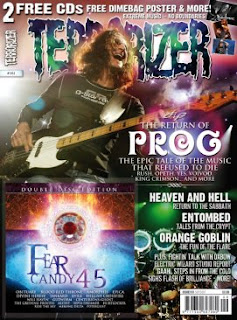 While prog never really left the building, it disappeared in many a journalists' eyes for the flashy and fashionable, not to mention the frenetic hunt of highly selcted parts of the underground scene for for the Next Big Bang. Which makes one gratefull for the return of prog in music magazines the last decade.
While prog never really left the building, it disappeared in many a journalists' eyes for the flashy and fashionable, not to mention the frenetic hunt of highly selcted parts of the underground scene for for the Next Big Bang. Which makes one gratefull for the return of prog in music magazines the last decade.Another good thing is that publications like Terrorizer have not fallen for the standard media myth. It however still speaks volumes that the magazine feels obliged to mention that
"Rock fans growing up in the 80's were regularly informed that punk rock destroyed prog rock forever. This is of course utter nonsense. In fact, throughout punk rock's brief flash of tabloid infamy and chart-topping ubiquity, the behemoths of prog rock - Pink Floyd, Genesis, Yes and ELP in particular - marched on, largely impervious to the impact of a cultural phenomenon that was far more significant in terms of its later influence than it was dominant at the time".That cultural phenomenon was little else than a new generation arriving, more fond of straight and simple music, raw and romantic, beer and beat, than something that needed engaging the intellect. In short, Prog rarely got you broads.
Looking at Terrorizer is a welcome breath of sanity (and dare I say honesty?) from more mainstream magazines. And despite the ritual reprimanding of ELP, Terrorizer is obviously in even more awe of that band than of other behemoths.
We are invited to a general and generous feature article, as well as several pages on Rush, Sean Maline (Cynic), the influence of Prog on Metal, Van der Graaf, Ian Anderson, Zombi and Steve Hackett. And great photos of Keith and Rick.
 Next issue is already in the kiosks (though not in Norway) and deals with stuff like Prog Art (capital letters needed, of course), Dream Theater, "forgotten prog" (hopefully they'll mention the forgotten fact that even Bowie and Elton John were influenced by prog in the early 70's), and Davy O'List (guitarist of early The Nice).
Next issue is already in the kiosks (though not in Norway) and deals with stuff like Prog Art (capital letters needed, of course), Dream Theater, "forgotten prog" (hopefully they'll mention the forgotten fact that even Bowie and Elton John were influenced by prog in the early 70's), and Davy O'List (guitarist of early The Nice).Rolling Stone Magazine and Q will in no way the next decade or two admit that Prog didn't "lose" to punk or retired (in the 80's prog related bands and artists sold more than most, while hundreds of new prog bands emerged - a trend which has only accelerated the last decades). Still, it is promising that niche magazines like Terrorizer are out of the cupboard.

Ingen kommentarer:
Legg inn en kommentar